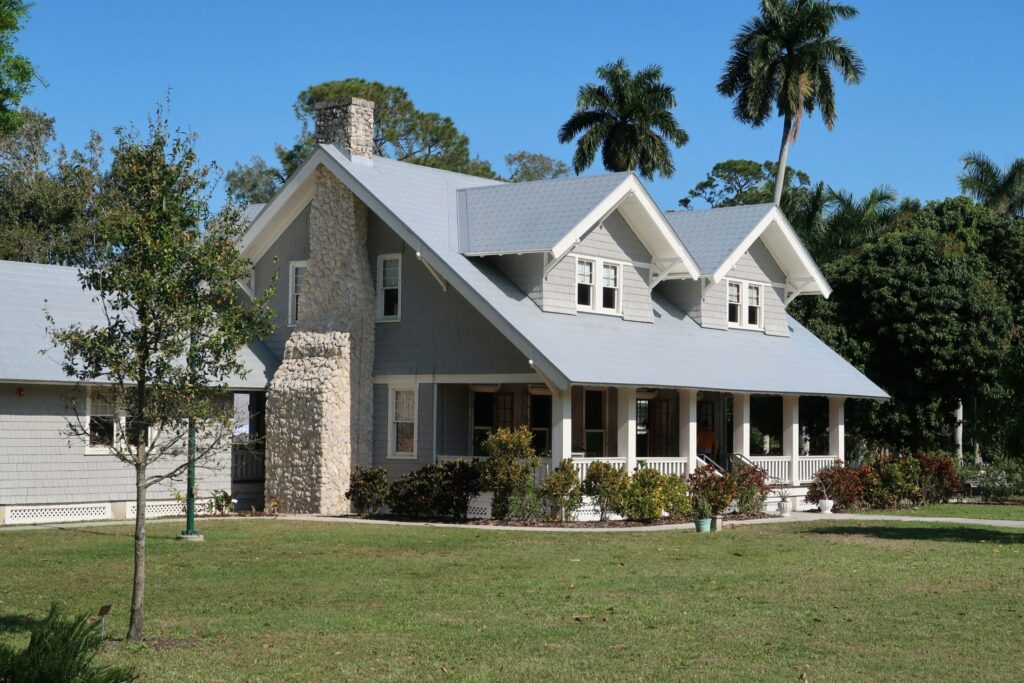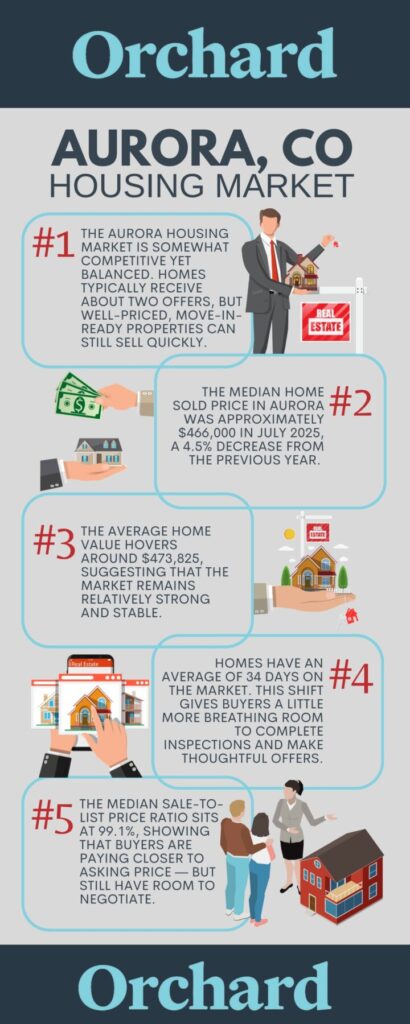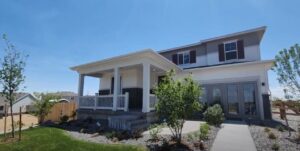Considering a move to the Denver metro area? Aurora, Colorado, might just check all the boxes on your wish list.
This growing city offers a unique blend of urban convenience, natural beauty, and a strong sense of community — all within easy reach of downtown Denver.
As Colorado’s third-largest city, Aurora is known for its diverse neighborhoods, expansive park system, and proximity to major job centers.
Whether you’re looking for affordable starter homes, upscale golf course communities, or brand-new construction, Aurora has options that fit a wide range of budgets and lifestyles.
This guide provides a comprehensive overview of navigating the Aurora, CO, housing market
in 2025 — from current pricing trends to top neighborhoods — so you can make an informed decision as a homebuyer.

The 2025 Aurora Housing Market at a Glance
The Aurora, Colorado, housing market in 2025 can best be described as somewhat competitive yet balanced. Homes typically receive about two offers, but well-priced, move-in-ready properties can still sell quickly.
The median home sold price in Aurora was approximately $466,000 in July 2025, a 4.5% decrease from the previous year. Despite this slight dip, the average home value hovers around $473,825, suggesting that the market remains relatively strong and stable.
Based on Aurora housing market trends, homes are taking slightly longer to sell compared to last year, with an average of 34 days on the market. This shift gives buyers a little more breathing room to complete inspections and make thoughtful offers.
Inventory is trending upward, with over 2,300 active listings in July 2025. More choices mean buyers have better chances of finding a home that fits their needs without facing intense bidding wars.

Key Trends Influencing the Aurora Market
Buyer Negotiation Power
The median sale-to-list price ratio sits at 99.1%, showing that buyers are paying closer to asking price — but still have room to negotiate, especially if a property has been on the market longer.
New Construction
Aurora’s new construction market is booming. Builders like Toll Brothers, Richmond American, and Oakwood Homes are offering hundreds of new builds with modern floor plans, smart home features, and energy-efficient designs.
Interest Rates & Affordability
Mortgage rates remain in the 6.5% to 7% range, which has slightly cooled demand but has not halted price growth thanks to a strong job market and steady in-migration.
Migration & Local Demand
Roughly 67% of Aurora homebuyers are searching within the Denver metro area, meaning local demand continues to support home values.

Natural Hazards
Aurora’s location means buyers should factor in the risk of wildfires, strong winds, and heat events when choosing a property and budgeting for homeowners’ insurance.
Exploring Aurora’s Diverse Neighborhoods

Affordable Options
For budget-conscious buyers, neighborhoods like Meadow Hills, Heather Gardens, and Summer Valley offer homes starting in the low $300Ks — perfect for first-time buyers or downsizers.
Upscale Communities
If you’re looking for a luxury lifestyle, consider Thunderbird Estates or Saddle Rock. These communities feature larger homes, golf course views, and access to top-rated Cherry Creek schools.
New Developments
The Aurora Highlands is one of the largest master-planned communities in the region, offering brand-new homes, commercial centers, parks, and future schools — ideal for those planning long-term residency.
Established Suburbs
Neighborhoods like Aurora Hills and Mission Viejo provide a classic suburban feel, with mature trees, parks, and a variety of housing options, including single-family homes, condos, and townhomes.
Strategic Tips for Aurora Homebuyers
Get Pre-Approved
This shows sellers you’re serious and positions you to act fast when the right home comes along.
Work with a Local Agent
A knowledgeable agent can help you navigate Aurora’s many neighborhoods and negotiate effectively.
Consider New Construction
You may find better incentives, energy efficiency, and peace of mind with a builder’s warranty.
Budget for All Costs
Don’t forget about closing costs (2–5% of purchase price), property taxes, and potential HOA fees.
Conclusion
Aurora’s 2025 housing market strikes a healthy balance between affordability, inventory, and opportunity.
While prices remain high compared to some nearby areas, the increase in available homes, combined with slightly longer selling times, means buyers have more leverage than in past years.
If you’re ready to explore Aurora, now is an excellent time to make a move. Connect with a local real estate professional, tour the neighborhoods, and find the home that matches your lifestyle in this vibrant and growing city.
Are you ready to explore your home options in Aurora, CO? Give me a call today at 702-506-5006 or email me at leahceller@gmail.com to schedule an appointment.
Frequently Asked Questions
What is the median home price in Aurora, CO?
The median home price in Aurora, CO, is $466,000, as of July 2025.
Is the Aurora housing market a buyer's or seller's market in 2025?
The Aurora housing market is a balanced market, slightly leaning toward buyers due to increased inventory.
What are some of the best neighborhoods in Aurora for homebuyers?
Popular picks include Saddle Rock, Meadow Hills, Aurora Hills, and the Aurora Highlands for new construction.
Are there new construction homes for sale in Aurora?
Yes — many builders are active, with new communities offering modern layouts and energy-efficient features.
How do Aurora home prices compare to other cities in the Denver metro area?
Aurora is generally more affordable than Denver and Boulder, making it attractive to budget-conscious buyers.
What should I know about natural hazards in Aurora, CO?
Wildfire risk, strong winds, and heat should be factored into insurance and home maintenance plans.
How long do homes typically stay on the market in Aurora?
On average, about 34 days in 2025 — giving buyers more time than in previous years.





